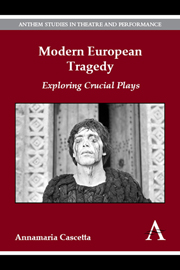Book contents
- Frontmatter
- Dedication
- Contents
- Acknowledgements
- Introduction: The Tragic, Tragedy and the Idea of the Limit
- Chapter 1 Hubris and Guilt: Gengangere (Ghosts)
- Chapter 2 Eve Becomes Mary: L'annonce faite à Marie (The Tidings Brought to Mary)
- Chapter 3 The School of Hatred: Mourning Becomes Electra
- Chapter 4 The Destiny of Man Is Man: Mutter Courage und ihre Kinder (Mother Courage and Her Children)
- Chapter 5 The Tragic and the Absurd: Caligula
- Chapter 6 Dianoetic Laughter in Tragedy: Accepting Finitude: Endgame
- Chapter 7 The Arrogance of Reason and the ‘Disappearance of the Fireflies’: Pilade (Pylades)
- Chapter 8 The Apocalypse of a Civilization: From Akropolis to Apocalypsis cum figuris
- A Provisional Epilogue: Between the Experience and the Representation of the Tragic: Towards a Performative Theatre
- Appendix: Chronology of Productions
- Notes
- Index
Chapter 5 - The Tragic and the Absurd: Caligula
Published online by Cambridge University Press: 05 September 2014
- Frontmatter
- Dedication
- Contents
- Acknowledgements
- Introduction: The Tragic, Tragedy and the Idea of the Limit
- Chapter 1 Hubris and Guilt: Gengangere (Ghosts)
- Chapter 2 Eve Becomes Mary: L'annonce faite à Marie (The Tidings Brought to Mary)
- Chapter 3 The School of Hatred: Mourning Becomes Electra
- Chapter 4 The Destiny of Man Is Man: Mutter Courage und ihre Kinder (Mother Courage and Her Children)
- Chapter 5 The Tragic and the Absurd: Caligula
- Chapter 6 Dianoetic Laughter in Tragedy: Accepting Finitude: Endgame
- Chapter 7 The Arrogance of Reason and the ‘Disappearance of the Fireflies’: Pilade (Pylades)
- Chapter 8 The Apocalypse of a Civilization: From Akropolis to Apocalypsis cum figuris
- A Provisional Epilogue: Between the Experience and the Representation of the Tragic: Towards a Performative Theatre
- Appendix: Chronology of Productions
- Notes
- Index
Summary
A great writer and an outstanding moral figure of the twentieth century was responsible for the next text we are to analyse: Caligula by Albert Camus. Hannah Arendt, writing to her husband from Paris, described him as ‘the best man in France’. Yet in his lifetime the novelist, a Nobel laureate, beloved of thousands of readers, remained, as is well known, at times isolated and unheeded in a period of ideological conflicts, of opposed blocs and the maîtres à penser of the century. Today, however, a revaluation is rightly under way. His moral authority, lucidity, courage and intellectual substance are restoring his authority. His distinctive identity is unusual among intellectuals, embracing both his modest origins in the African periphery and the bourgeois circles of the intellectual capital of Europe. His familiarity with literary culture and the true, living culture of the theatre, his militant antifascist engagement and his independent, honesty of judgement – all these qualities today exert a new fascination.
And his position on the theme of the theatre of the tragic today appears both profound and extremely fruitful. The text presents another side of the modern elaboration of the tragic consciousness, the representation of an absolute passion, of life, love, power, creating a short circuit between man and God. This leads to the man becoming a tyrant and mistaking himself for a god against the backdrop of the absurd, the denial of meaning. The results is that he ravages the world and plunges it into chaos.
- Type
- Chapter
- Information
- Modern European TragedyExploring Crucial Plays, pp. 75 - 90Publisher: Anthem PressPrint publication year: 2014



